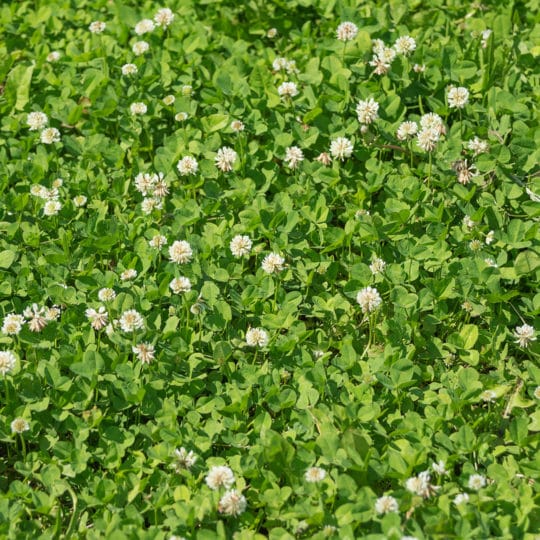Effective Broadleaf Weed Control
From Prevention to Control Products
Posted
July 4, 2024

Weeds are a common nuisance in lawns and gardens throughout the year, but especially during the summer when they’re actively growing. Some of the most prolific weeds are of the broadleaf variety, since their wide, flat leaves stand out among the tall, thin grass. Left untreated, weeds not only disrupt the aesthetics of your lawn, but they also compete with desired plants for nutrients, water, and light. Effective broadleaf weed control requires a combination of prevention, identification, and treatment for these specific types of plant.
Identifying Broadleaf Weeds
While broadleaf weeds are all categorized by their wide, veiny leaves, there are several varieties that differ in shape and size.
- Dandelions are known for its yellow flowers and fluffy seed heads.
- Clover produces trifoliate leaves and white or pink flowers.
- Plantain has broad, flat leaves and tall, slender flower spikes.
- Chickweed is a creeping variety with small, star-shaped white flowers.
- Wild strawberries have wiry runners that also creep above-ground and produce small, red fruit.
Given their ability to grow flowers and fruit, broadleaf weeds are easier to identify than their grassy weed counterparts. However, identifying them means you have more work to do to control them. First, you want to prevent them from even infiltrating your lawn.
Weed Prevention
Most weeds pop up in the bare, unkept areas of your lawn. Noticing a number of different weeds may give you an indication that your soil needs additional nutrients or better drainage. Here are some weed prevention methods to try and keep your lawn lush and healthy.
- Regular mowing, proper fertilization, and adequate watering promote dense grass growth, which outcompetes weeds.
- Test the pH levels in your soil and amend as necessary for a nutrient-rich lawn.
- Add a few layers of organic mulch to garden beds to suppress weed growth. Mulch also helps retain moisture, regulate temperature, and block light that weeds need to germinate.
- Aerate your lawn to help improve soil health by allowing air, water, and nutrients to reach the grass roots, making the lawn more competitive against weeds.
- Overseed your lawn to revitalize grass and fill in bare spots.
- Inspect your lawn and garden frequently for new weed growth. Early detection and removal prevents weeds from establishing and spreading.
If you do happen to notice weeds popping up, there are several ways to quickly remove and control the spread.
Broadleaf Weed Control Products
Controlling weeds is easier when you catch them in the early stages. Once a weed becomes established in your lawn, it’s going to take more effort to get rid of it, especially if you can’t get to the root. Here are some natural options to help make sure the weed is killed, root and all.
- Hand-pulling weeds can be effective for small infestations. Tools like weed diggers or hoes help make the job easier.
- Pour boiling water directly on weeds to help kill them in cracks of sidewalks or driveways. Avoid hitting desirable plants nearby.
- Mix vinegar, water, and a few drops of dish soap to spray on weeds. The acetic acid in vinegar desiccates the leaves.
- Apply corn gluten meal in the spring to help prevent weed seeds from germinating.
Multiple applications may be required, especially when using a more natural method. There are also a number of chemical control methods that may prove to be more effective.
- Selective herbicides target broadleaf weeds without harming grass.
- Non-selective herbicides kill all plants they come in contact with and are best used for spot treatments or in areas where you want to get rid of any vegetation.
- Pre-emergent herbicides should be applied in the early spring before weed seeds germinate. They create a chemical barrier that prevents seedling growth.
- Post-emergent herbicides can be used once the weed is actively growing in the spring, summer, or fall.
Any time you’re using a chemical product, even if it claims it’s safe for use around people and pets, it’s always important to follow label instructions carefully. Avoid mowing the lawn immediately before or after weed control applications to maximize absorption.
Professional Broadleaf Weed Control
Since effective weed control requires a combination of proactive measures, natural remedies, and chemical treatments, sometimes it’s best to call a professional for assistance. Not only can Cardinal Lawns help control weeds, but we provide additional lawn maintenance services that promote a healthy lawn, preventing weeds from returning.

Download Your FREE Lawn Weed Guide
Before weeds take over your yard this season, learn to identify and prevent them in the first place. Keep your lawn looking great all year!